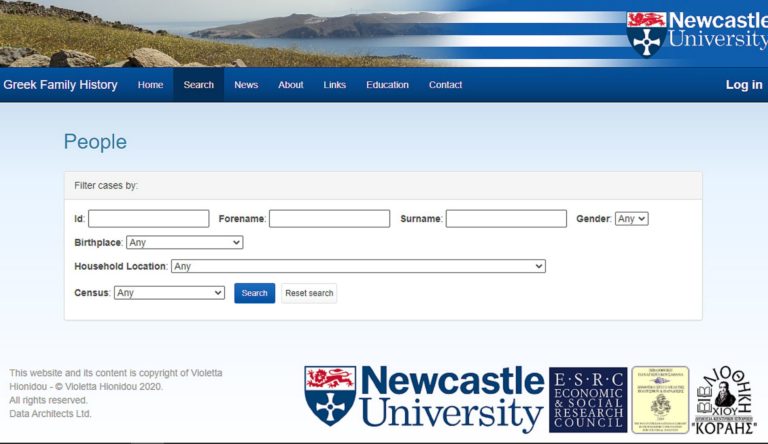A website developed by a Greek historian based in Britain is offering Greek seekers the help they may need to trace their family history from a range of sources.
Historian and author Violetta Hionidou developed the Greek Family History site. A senior lecturer in Modern European History at Newcastle University in Britain, Prof Hionidou told Neos Kosmos that people were becoming more interested in developing their family histories because the process was simpler with many official records becoming “digitised” and were more accessible than in the past.
“We are at the start of this process in Greece and the Greek Family History site offers a good guide about how to go about things,” said Professor Hionidou.
“The starting point of any family history search must begin with talking to the people who knew the family member you are interested in finding on record. Talk to uncles, aunts, parents and friends. Get the oral history first as this will lead you to places and times in which the person lived,” she said.
READ MORE: A Greek Australian Archive, documenting the community’s early years has been launched
Part of the benefit of building up a family history, is that the children can be drawn into the process and encouraged to talk to their older relatives about what they know. In this way, she said the children would deepen their relationships with their elders and also gain a greater understanding of the past. In talking to as many people as possible, a fuller picture emerges, said the professor.
The site advises people to ask about relevant dates, names of siblings and their important dates. Even if those dates are not accurate, they can help to narrow down a search in official records.
“When talking to relatives about the past, be sensitive. Some of the stories may involve personal details difficult for the speaker to recollect. Despite your desire to discover everything that is relevant to your family history, it is important to be respectful of the wish of the speaker to withhold information, if that is what they want,” Prof Hionidou advises on the site.
“This website aims to provide guidance on how to do Family History with Greek sources. Sources are the basis for any Family History, the conduct of which is shaped by the existing records.”
Prof Hionidou said much information on the website was derived from population censuses that the Greek state carried out since its creation in 1832 and which have been held on a regular basis since. As the Greek state grew, it carried out censuses of the new areas.
For example, there was an extraordinary census of Thessaly and Arta when they were incorporated in 1881. In 1913, a census was held in the new regions of Macedonia, parts of Epirus, some of the islands in the Aegean and Crete.
READ MORE: Readers respond well to call for stories of old Yarraville
Following the arrival of more than one million refugees from Asia Minor in 1922, the Greek state made a serious effort in the census of 1928 to record the extent of the refugee population.
Prof Hionidou said an important source of official information is the Dimotologia – the continuous register of a family that are stored in every community or municipality in Greece. Other sources include church parish records and the archives of the armed forces.
“Unlike countries in Western Europe, the US and Australia where a lot of information is available through their online records, Greece does not yet have such facilities. We are at a starting point in Greece and the website offers a good guide about how to go about things,” the professor said.
“It is a game of patience and time. While information may be accessible online, you still have to get in touch with civil servants who may not feel it is part of their role to answer your questions. The Greek Family Website helps you to understand what is available.
“The importance of family history today lies in the fact that anyone, from any walk of life, can attempt to trace their own family’s history; it is no longer necessary to be a member of the aristocracy to be able to trace one’s own ancestors,” says Prof Hionidou on the website.
♦ For more information Greek Family History website. Prof Hionidou also has provided links to the Greek military archives and a 1922 refugees’ site.
READ MORE: Unique oral history project set to cover all corners of Greece










